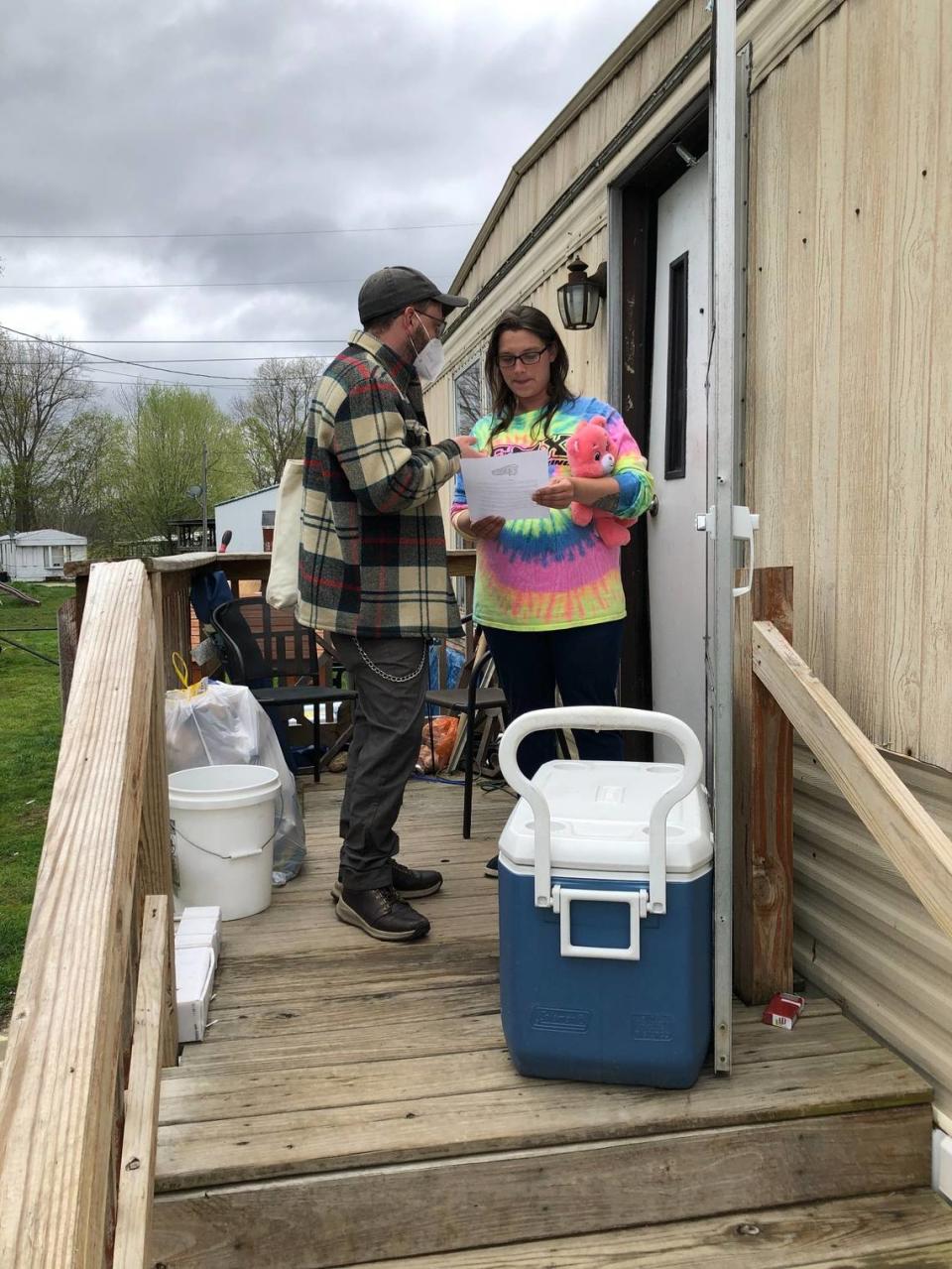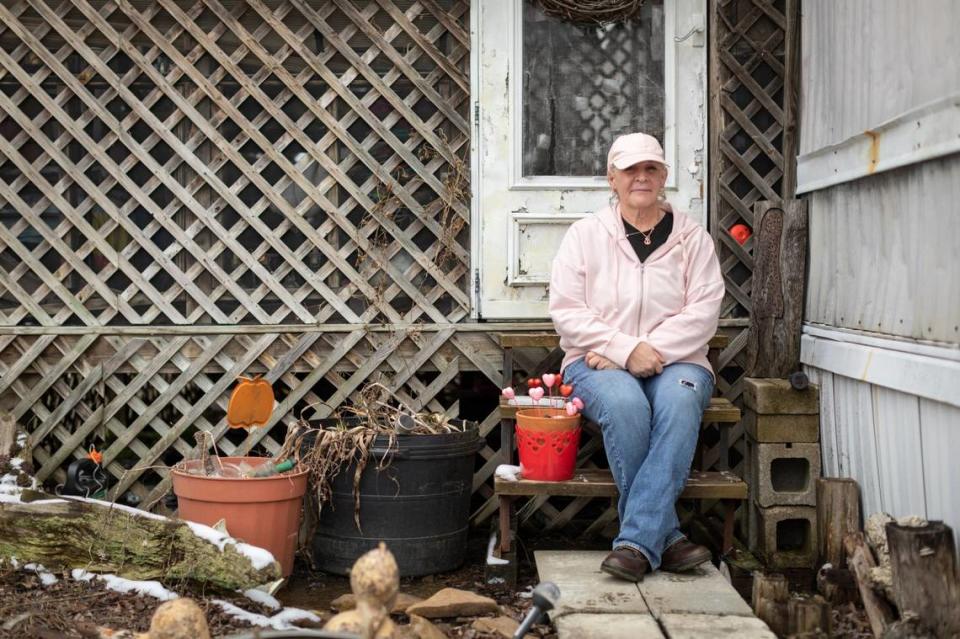‘It’s disgusting.’ KY tax incentive used to evict mobile home park for shopping center.
Samantha Massey was seven months pregnant on March 6 when she got a letter telling her that she and her husband and her five-year-old daughter, Rebel, were being evicted and would have to move their mobile home out of the North Fork park off I-64 by April 30 because it had been sold to Lexington developer Patrick Madden to build a shopping mall.
Massey and her husband, Cody, had finished paying off the 1985 mobile home last October, and owned it outright. Only Morehead and Rowan County no longer allows any mobile homes built before 1995. So they couldn’t move it. And thanks to Morehead State University, most rent in Rowan County is too high for the Masseys to afford. Now eight months pregnant, and she’s sold the mobile home, but isn’t sure where they’re going next.
“We may have to get out the county or the state,” Samantha said on Monday, as Rebel played at her feet. “It’s an absolute mess. Everyone up here has been done dirty.”

As part of the deal to evict more than 50 residents, the North Park owner, Joanne Fraley of Fraley Commercial Properties offered $1,000 to each resident for moving costs. People who rented homes just had to leave. The nonprofit Frontier Housing is trying to help others. Fraley decline to comment for this column.
But $1,000 barely covers the cost of moving and restarting utilities, and certainly not enough to help with new and much more expensive rent.
Mindy Davenport has lived at North Park for 25 years, and her mobile home is surrounded by carefully bordered gardens around the front. She built a screened-in porch off the side. She’s started to pack up some clothes but hasn’t gotten very far because it all seems so overwhelming.
“For some of us, all we want is more time,” she said.
With the help of community organizers, the residents put together a group, Justice 4 North Fork, which organized a rally at the Morehead city council meeting on Monday night to ask for just that. Mayor Laura White-Brown agreed to meet with residents on the issue at a later date, but council members did not talk to the protesters.
“I understand both parts of the discussion here, and I trying to balance the needs of our residents with the continued growth of our community,” she said on Monday afternoon.

‘It’s disgusting’
Most residents found out about the sale in December because Samantha Massey happened to see a Facebook post from a city council meeting where officials discussed putting the development into a tax increment financing district, known as a TIF, basically a government subsidy to spur development.
Basically, TIFs allow developers to keep some of the increased taxes produced by the new development so they can offset construction or infrastructure costs. In this case, the agreement between Madden, the city and Rowan County will suspend 90 percent of the increase in property and occupation taxes for 30 years, a sum that will be capped at about $11 million. This does not include school taxes.
North Park’s 22 acres make up the only undeveloped corner of Morehead’s I-64 exit, in other words, prime real estate for gas stations, restaurants and stores. Madden, who developed his family farm into the gargantuan Hamburg Place, has continued to do commercial development around the state and said the interstate corner was an attractive one. He told me he had never used a TIF in any of his developments before this, but “this project did not make sense economically without the TIF,” he said. “There was too much infrastructure work to be done to make the numbers work.”
The Morehead site qualified as a TIF because 50 percent of its buildings are “deteriorated” and 40 percent of its residents are low-income. Except there won’t be any more building or any more residents, and they will certainly not be helped by the change.
TIFs were invented to aid redevelopment of blighted, abandoned urban and industrial areas, but they have been bastardized out of all recognition now, the definition changing whenever a wealthy developer can hire lobbyists that rewrite the law, as happened with Lexington’s Summit development. They were not invented to make poor people even poorer and also homeless, during a pandemic. This goes against the idea of community improvement that TIFs are supposed to facilitate. The state has never tried to gauge what the effects have been, besides billions lost in property taxes.
This is capitalism, you say, what happens in a free market. It was a private sale between Fraley Commercial Properties and Madden. Well, yes, capitalism for the mobile home residents, who live with the results, and socialism, or corporate welfare for the developer, who is one of the most successful businessmen in Kentucky.
Government is not supposed to pick winners and losers in a free market economy, which is why Kentucky’s expanded program has picked up plenty of opponents from conservatives, as well as progressives.
“Kentucky’s TIF program is out of control,” said Andrew McNeill, who was Deputy State Budget Director for former Gov. Matt Bevin and is now a Visiting Policy Fellow at the conservative Bluegrass Institute. “What started as a program tailored to promote investment in legitimately blighted areas has turned into corporate welfare for developers. This Morehead TIF application is only the latest example.”
McNeil called it a “complete manipulation” of the original TIF program to use the low-income designation of residents who are being evicted, as the law was supposed to improve their lives, not kick them out of their homes.
“I believe any property owner has the right to repurpose the site and maximize the value of their investment,” he said. “There is a role for government support narrowly targeting severely blighted areas in the state. But I don’t think it’s defensible that these developers are manipulating a government program to qualify for taxpayer subsidies to develop what should already be an attractive retail location off the interstate — and then planning to kick people out of their homes. In fact, it’s disgusting.”
Affordable housing?
There are really two problems here: The overuse and abuse of TIF statutes, and the larger lack of affordable housing.
The COVID pandemic, which required massive aid to prevent evictions, showed us what a big problem we have, said Adrienne Bush, executive director of the Homeless and Housing Coalition of Kentucky.
“Part of the reason COVID was such an issue is because housing wasn’t affordable to begin with,” Bush said. “Kentucky was already 77,000 units behind what it needed for people who are low-income to be able to afford their homes.”
Then add in college town rates. “The rental market is tighter there, and the upfront costs are what kill you. Can you afford first and last month deposit, security and utility deposits, then the moving costs?”
Kentucky has double the rate of manufactured housing, or mobile homes, about 12 percent of the population as opposed to 6 percent nationwide, according to the Housing Assistance Council. That’s because there’s simply not enough affordable housing anywhere, Bush said.
“The market is broken and it’s not the fault of poor people,” Bush said. “If we have this many people who struggle to pay rent in a pandemic, then it’s a systemic problem, we need to figure out to increase the supply of housing and make sure it’s affordable.”
On Monday, Crystal Barnett watched in tears as a moving company tried to hoist her mobile home onto a truck. She paid $125 a month in rent for her space at North Fork, and it will cost $3,500 to move her trailer, and that doesn’t include hooking it up to water and sewer. But in the end, she thinks it will still be cheaper than $800-1,200 a month for renting an apartment or house.
“We’ve been lied to this whole process,” she said.
Rowan County Judge Executive Harry Clark said the North Fork situation was inevitable because Fraley was planning to sell the property anyway. “Would it have been at this pace? I doubt it,” he said. “The right answer to this is more affordable housing and Morehead is not it.”

